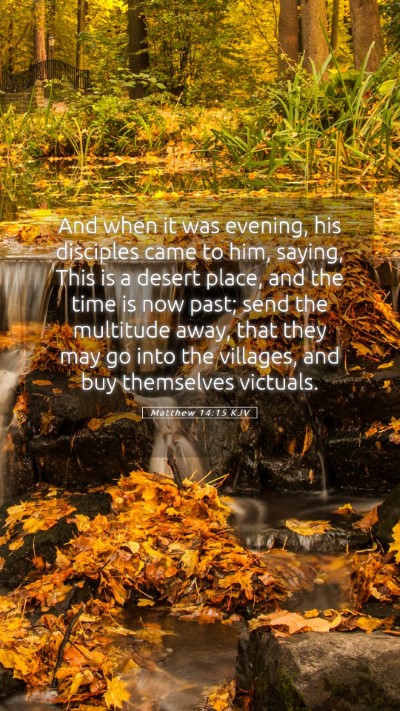Understanding Matthew 14:15
In Matthew 14:15, we find a pivotal moment in the ministry of Jesus that illustrates His compassion and the challenges faced by His disciples. The verse reads:
"And when it was evening, his disciples came to him, saying, This is a desert place, and the time is now past; send the multitude away, that they may go into the villages, and buy themselves victuals."
Verse Breakdown
-
Context of the Verse:
This verse occurs in the context of the feeding of the 5,000, highlighting the need for the multitude to be fed and illustrating the logistical concerns of Jesus’ disciples.
-
Disciples' Concern:
The disciples express their worry about the people being in a deserted place without food. Their request to send the crowd away reflects a practical, yet limited human perspective.
-
Jesus' Compassion:
While the disciples are focused on the challenges, Jesus’ ministry is characterized by compassion and care for the needs of the people.
Bible Verse Meanings
According to public domain commentaries:
-
Matthew Henry:
Henry emphasizes that Jesus is aware of the needs of the crowd and that the disciples often fail to see possibilities where there seem to be none. This shows a lack of faith in Jesus’ ability to provide.
-
Albert Barnes:
Barnes elaborates on the human nature and limitations seen in the disciples' request. He notes that their suggestion reflects an understanding that they cannot meet the needs of the people with the resources available to them.
-
Adam Clarke:
Clarke points out the location being a 'desert place' signifies a place lacking in provision. This highlights the miraculous nature of Jesus' subsequent actions, showing that divine provision often comes from the most unlikely circumstances.
Interpretative Insights
This verse offers rich opportunities for interpretation and understanding:
-
Practical Needs vs. Faith:
It illustrates the tension between recognizing practical needs and relying on faith to meet those needs. This can be applied to countless situations in life where human limitations confront divine possibilities.
-
Community Care:
The verse also invites reflection on the Church's role in meeting community needs, inspiring believers to be proactive in caring for others.
-
Jesus as Provider:
Ultimately, this verse leads us to consider Jesus not only as a teacher but as a miracle worker and provider who cares deeply for those who follow Him.
Application of the Verse
In applying the meaning of Matthew 14:15 to our lives, consider the following:
-
Trusting God in Difficult Situations:
Even when resources seem limited, trusting in Jesus' capability to provide is essential.
-
Being Attentive to Needs:
As Christians, it's vital to be aware of the needs around us and seek ways to address them through outreach and service.
-
Faith in Action:
This scripture challenges believers to move beyond mere observation of needs to take action — much like Jesus did.
Cross References
This verse relates closely to several other scripture passages, enhancing our understanding:
- John 6:1-14: The full account of the feeding of the 5,000.
- Philippians 4:19: Paul's assurance that God will provide for every need.
- Matthew 15:32: Jesus’ concern for the crowd’s hunger emphasizes His compassion.
Conclusion
Matthew 14:15 serves as a powerful reminder of the importance of faith and community care in the face of challenges. Through an understanding of this scripture, we can gather valuable Bible study insights that encourage trust in the Lord as the ultimate provider.


